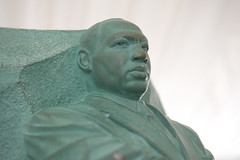1. MLK grew up during the Great Depression. T / F
2. He was, politically speaking, a __ .
a) conservative b) liberal c) radical d) libertarian
3. Away from leading political forces, being a __ was his job. a) clergyman b) US Representative c) pharmaceutical sales
d) attorney.
4. His religious denomination: a) Methodist b) Catholic c) Unitarian d) Baptist.
5. His birthplace was a large city in __. a) Alabama b) Mississippi c) Georgia d) South Caroolina.
6. He graduated with a Bachelors degree from a) Harvard b) Columbia c) Howard Univ d) Morehouse College.
7. In the 1930's he and his father changed their names to Martin Luther King. His original name was a) Lawrence b) Millard c) Cedric d) Michael.
8. The King family name change took place after a family visit to the European nation of __, which was Martin Luther's home.
a) France b) Germany c) England d) Belgium.
9. King used the teachings of Mohandas K. __ as a guide to non-violent protest.
a) Patel b) Singh c) Ghali d) Gandhi.
10. In 1955, King went to Montgomery, Ala, to lead a boycott of the public bus system. This protest was initiated by the civil disobedience of a) Claudette Colvin
b) Howard Thurmann c) Coretta King d) Rosa Parks.
11. In King's era, racist policies and statutes were known as __ __ laws. a) Black face b) Colored peoples c) Jim Crow d) utterly ridiculous.
12. King helped establish one of these: a) NAACP - National Assoc for the Advancement of Colored People b) SCLC - Southern Christian Leadership Council
c) ACLU - American Civil Liberties Union.
13. In the 1960's peaceful public protest often resulted in __ , as directed by governors, mayors and police. a) honors b) arrests c) lawsuits.
14. The civil rights movement protest technique called a "sit-in" was often used to protest segregation of a a) schools b) public swimming pools c) restaurants d) barber & beauty shops.
15. King's telephones (at home or in a hotel) were "tapped" by the FBI under the orders of president a) Eisenhower b) Nixon c) Kennedy d) Johnson.
16. In Southern states during the 1950's and 60's most black people were severely discouraged from __ . a) voting b) moving from location to location c) moving from job to job d) Having large families.
17. The great civil rights protest march held in Washington, DC, in which the "I have a dream" speech was given by King: a) 1953 b) 1963 c) 1973 d) 1983.
18. Racial integration in US public schools was technically ended in 1954, with the Brown v Board of Education decision, but in fact it continued to 1964, when Congress passed the Civil Rights Act of 1964. T / F
19. Prior to the Civil Rights Act of 1964 public facilities in many states were segregated under the "separate but equal" judgment. That included all but one of these: a) schools b) restaurants c) US Army d) doctor's offices.
20. King got a PhD from Boston University in theology. In the 1980s, according to Wikipedia, an inquiry concluded that portions of his dissertation had been improperly taken from other sources. He was guilty of __
a) calumny b) sedition c) controversy d) plagiarism.
21. He was assassinated in 1968 on the balcony of a motel in the city of __. a) Memphis b) Chicago c) New Orleans d) St Louis.
skip to main |
skip to sidebar
For students and parents who love education and exploration of the social sciences . . .
Search This Blog
Followers
Blog Archive
-
▼
2011
(242)
-
▼
January
(9)
- Blue bins: let city council members know you suppo...
- Rock to a capella, from LAX to ROTC, see Snaps fro...
- "Lawrence of Arabia:" 85 questions that help illum...
- 5 Pillars of Islam illustrations due Fri; 12 pts
- Feast of the Middle East, Fri, Jan 28; 12 pts.
- MLK jr. quiz
- Abraham the Patriarch / Ibrahim the Prophet
- The Land that is Holy to 3 religions: Palestine / ...
- World geography, second semester, begins with the ...
-
▼
January
(9)

